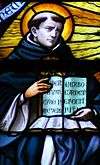Maurice Blondel
| Maurice Blondel | |
|---|---|
| Born |
2 November 1861 Dijon |
| Died |
4 June 1949 (aged 87) Aix-en-Provence |
| Alma mater | École Normale Supérieure |
| Era | 19th-/20th-century philosophy |
| Region | Western Philosophy |
| School | French Spiritualism |
Main interests |
Philosophy of action Christian philosophy |
Notable ideas | Philosophy of action |
|
Influences
| |
Maurice Blondel (French: [blɔ̃dɛl]; 2 November 1861 – 4 June 1949) was a French philosopher, whose most influential works, notably L'Action, aimed at establishing the correct relationship between autonomous philosophical reasoning and Christianity.
Biography
Blondel was born in Dijon in 1861. He came from a family who were traditionally connected to the legal profession, but chose early in life to follow a career in philosophy. In 1881, he gained admission to the École Normale Supérieure of Paris. In 1893 he finished his thesis "L'Action" (Action), a critical essay of life and of a science of the practice. He was at this time refused a teaching post (as would have been his due) because his philosophical conclusions were deemed to be too 'Christian' and, therefore, "compromising" of philosophical reason. In 1895, however, with the help of his former teacher Émile Boutroux, he became a Maître de Conférences at Lille, then shortly after at Aix-en-Provence, where he became a professor in 1897. He would remain in Aix-en-Provence for the rest of his career.[2]
In L'Action, Blondel developed a "philosophy of action" that integrated classical Neoplatonic thought with modern Pragmatism in the context of a Christian philosophy of religion. He held that action alone could never satisfy the human yearning for the transfinite, which could only be fulfilled by God, whom he described as the "first principle and last term."
His subsequent works, the Letter on Apologetics and History and Dogma, were also connected to the philosophical problem of religion. They unleashed an enormous controversy at the time of publication. Pope Pius X's 1907 encyclical Pascendi dominici gregis, which targeted the 'Modernist' threat to Catholic thought, targeted Blondel to some degree, and for many years his thought remained associated (perhaps tenuously) with the Modernists. He did, however, have great influence on later Catholic thought, especially through ressourcement theologians such as Henri de Lubac.[3]
His wife died in 1919 and in 1927 he retired for health reasons. Between 1934 and 1937 he published a trilogy dedicated to thought, being and action. In 1935, he published an essay of concrete and integrale ontology "L'être et les êtres" (The Being and the Beings) and in 1946 he published "L'esprit chrétien" (The Christian Spirit).
Blondel died in Aix-en-Provence in 1949. He was the younger brother of historian Georges Blondel and a first cousin of physicist André Blondel.
Works
- L'Action: Essai d'une critique de la vie et d'une science de la pratique (Paris: Alcan, 1893); 2nd edn, Paris: PUF, 1950).
- (English) Action (1893): Essay on a Critique of Life and a Science of Practice, trans. Olivia Blanchette (Notre Dame: University of Notre Dame Press, 1984).
- Lettre sur les exigences de la pensée contemporaine en matiere d'aplogétique et sur la méthode de la philosophie dans l'étude du probleme religieux (1896) - commonly called La lettre in French, and the Letter on Apologetics in English
- (English) The letter on apologetics and History and dogma, edited and translated by Alexander Dru and Illtyd Trethowan (London: Harvill Press, 1964)
- History and Dogma (1904)
- (English) The letter on apologetics and History and dogma, edited and translated by Alexander Dru and Illtyd Trethowan (London: Harvill Press, 1964)
- L'être et les êtres – Essai d'ontologie concrète et intégrale (1935) [also PUF, 1963]
- L'ésprit chrétien (1946)
- Lettres philosophiques (Paris: Aubier, 1961)
A nine-volume edition of the complete works of Blondel is being published. Two volumes (as of 2013) have been published.
- Oeuvres completes, i, ed Claude Troisfontaines (Paris: PUF, 1995) [which contains L'Action, as well as a minor Latin thesis on Leibniz which accompanied L'Action in Blondel's doctoral submissions]
- Oeuvres completes, ii, 1888-1913: La philosophie de l'action et la crise moderniste, ed Claude Troisfontaines (Paris: PUF, 1997)
See also
References
- ↑ Sutton, Michael (1982). Nationalism, Positivism, and Catholicism. The Politics of Charles Maurras and French Catholics 1890-1914. Cambridge: Cambridge University Press. ISBN 0-521-22868-9. p. 124.
- ↑ Michael A Conway, 'Maurice Blondel and Ressourcement ', in Gabriel Flynn and Paul D. Murray, Ressourcement (Oxford: OUP, 2012), p70.
- ↑ Michael A Conway, 'Maurice Blondel and Ressourcement ', in Gabriel Flynn and Paul D. Murray, Ressourcement (Oxford: OUP, 2012), p70.
Further reading
- "Maurice Blondel". Internet Encyclopedia of Philosophy.
- James Somerville, Total Commitment: Blondel’s L’Action (Washington DC: Corpus, 1968).
- Andreas Uwe Mueller, Christlicher Glaube und historische Kritik. Maurice Blondel und Alfred Loisy im Ringen um das Verhaeltnis von Schrift und Tradition (Freiburg, Herder, 2008).
- Peter Henrici. Hegel und Blondel: Eine Untersuchung uber Form und Sinn der Dialektik in der 'Phanomenologie des Geistes' und der ersten 'Action'. Pullach bei Munchen: Berchmanskollege, 1958.
